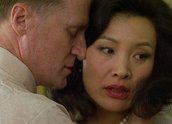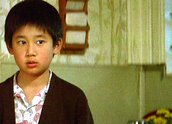


The Home Song Stories (2007)
Synopsis
In Hong Kong in 1964, a beautiful nightclub singer meets an Australian naval officer. Rose (Joan Chen) comes to Australia with her two young children, Tom and May, but leaves Bill (Steven Vidler) after one week of marriage. Seven years and many boyfriends later, Rose has nowhere to go. She moves back in with ‘Uncle Bill’, under the disapproving eye of his mother Norma (Kerry Walker). When Bill goes to sea again, Rose brings home her latest lover, a young Chinese immigrant called Joe (Qi Yuwu), so Norma kicks her out. They move to a dingy flat with ‘Uncle Joe’, where Tom (Joel Lok), who’s now about ten, has to share a room with his sister May (Irene Chen), who’s about 14. Rose takes an overdose of pills after a fight with Joe – not for the first time. She survives, but the recovery is shattered when she realises that Joe is in love with May. Rose attacks her daughter, and both end up in hospital. Tom, alone and angry, is sent to stay with ‘Uncle Bill’ again. May makes her brother promise to keep their mother safe, but nothing can save Rose. Many years later Tom, now a writer, is still haunted by the memories of his childhood, and a mother he is still trying to understand.
Curator’s notes
The Home Song Stories is a largely true story, which makes it even more shattering as a portrait of a family. Tony Ayres describes it as an autobiographical tearjerker, or ‘weepie’, but that is perhaps his way of controlling the story’s power. The script, he has said, took him three years to write. He imagined he was trying to write a film about his mother; eventually he realised it was a story about a boy’s loss of innocence. The beginning and ending, in which a writer is seen typing at a desk, gives us the sense that it’s also about the man that boy became, and the memories he is still trying to make sense of.
Beneath the family drama, it is also a story about migrants, and the speed with which children adapt. ‘Home’ has at least two meanings here – there is the home in China, the mother country, and there is the lack of stable sense of home in Australia. The family keeps moving as Rose’s relationships fall apart. Tom has no friends because they never stay long enough in one place. Nevertheless, in the seven years between arriving in 1964 and 1971, when most of the story takes place, both children have become Australianised in a way that Rose can never become. This, we assume, may be part of what ails her – although the script doesn’t overstate her disaffection with Australia. The causes of Rose’s mental deterioration are more complex and some of them come with her, in a personality that was already deeply scarred (not that either child understands this until much later).
The film succeeds largely on the basis of the performances, which are uniformly superb. Joan Chen’s Rose is a tour de force, perhaps the best role of an already distinguished international career. She goes from gorgeous siren, striding confidently through suburban Melbourne streets in a beautiful cheongsam dress, to a screaming harpy with mental problems. At the same time, Rose is almost always a sympathetic character; we can always read her emotions and sense a reason for her behaviour. She is also capable of great joy and love for her children, at least until her spirit is broken.
The performances of Joel Lok and Irene Chen, as the older children, are equally remarkable. Ayres makes great use of the boy’s eyes, giving us a sense that Tom misses nothing but says very little, storing up the frustration and hurt because he doesn’t know what else to do with it. There’s also a strong sense of the glamour that the boy feels from his mother, with her film star looks and her trunk of beautiful silk dresses. That helps to balance the sense of accusation, which could easily have derailed the script. The film would fail if audiences simply condemned Rose as a bad mother, but that is unlikely, because we can see her partly through the eyes of both children, as well as through her own sense of self. It’s a profoundly moving film on many levels.
- Overview
- Curator’s notes
- Video 3 clips

- Principal credits
- Find a copy
- Comments 1
- Add your review



